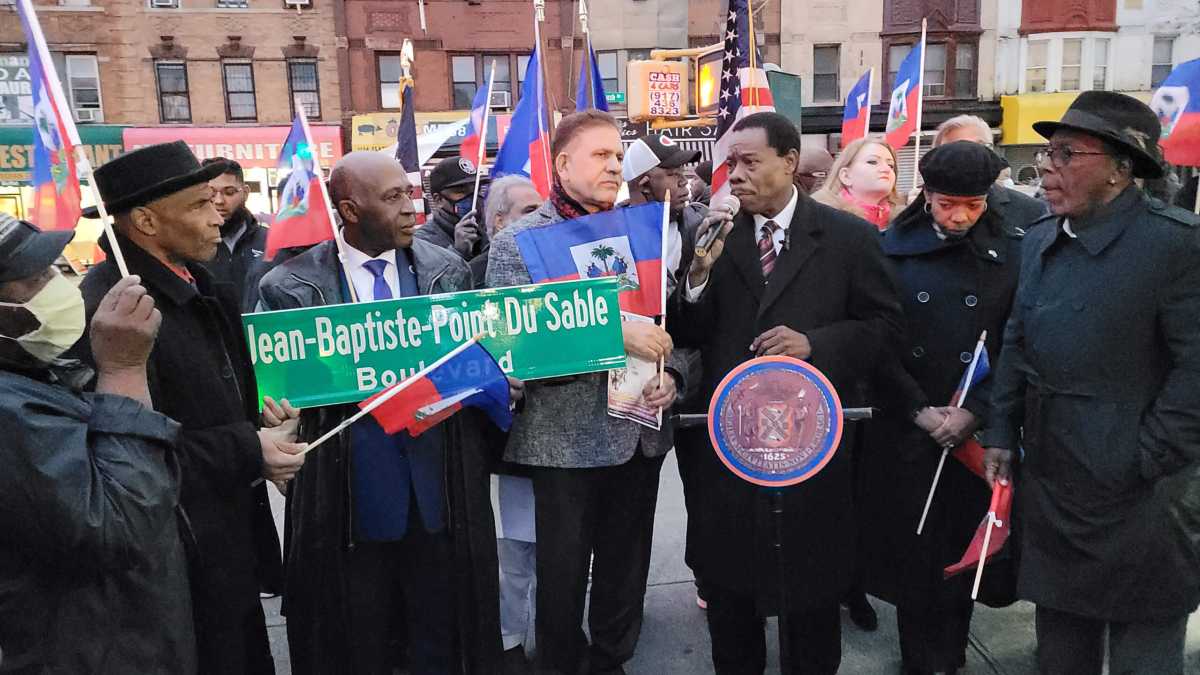Haitian-born Councilman Dr. Mathieu Eugene on Sunday spearheaded an initiative to rename a huge section of a street in Brooklyn in honor of his late compatriot Jean Baptiste Point Du Sable, who also founded Chicago.
During a ceremony, at the corner of Clarendon Road and Flatbush Avenue in the Flatbush section of Brooklyn, Dr. Eugene, the first Haitian to be elected to the Council, joined elected officials and community leaders in officially co-naming Flatbush Avenue, between Empire Boulevard and Foster Avenue, as Jean Baptiste Point Du Sable Boulevard.
“I want to thank everyone who came here to join us, because this is a momentous occasion, a very important event for the community,” said Dr. Eugene, who represents the primarily Caribbean 40th Council District in Brooklyn. “The reason we are here is because we are going to co-name part of Flatbush Avenue as Jean Baptiste Point Du Sable Boulevard.
“Some people may ask, ‘Why”?’” added Dr. Eugene, who, in January, will demit office after serving, for 12 consecutive years, in the City Council. New York Charter forbids Eugene from serving another four-year term.
He will be succeeded by another compatriot, Rita Joseph, a public school teacher in Brooklyn.
“I think it is very important that we embrace the legacy of people who used to bring other people together for the common good,” Dr. Eugene told the ceremony. “He (Jean Baptiste Point Du Sable) was a Haitian who came to the United States of America. He set out in Chicago, where he was a business entrepreneur, and he was somebody who used his skill to bring people together in order to better the community in Chicago.

“He was a Black man, but, more importantly, he was an immigrant, which means he was a very important person for the immigrant community, and that is what the American Dream is about,” the councilman continued. “Immigrants come to the United States from all over the world, seeking a better life for themselves and their children, but the most important thing is they make tremendous contributions to The United States of America.
“The history of Jean Baptiste Point Du Sable is the history of so many immigrants,” Dr. Eugene said. “That is why we are here today, to not only pay tribute to Jean Baptiste Point Du Sable, but to also celebrate the legacy of so many members of the immigrant community who came to the United States to make America such a wonderful country.”
The councilman described Jean Baptiste Point Du Sable as “a Haitian pioneer who traveled to the United States and settled in what is today known as Peoria and Chicago, Illinois, and he is recognized by historians as the founder of Chicago.
“His ability to translate for different cultures, including the English, French, Spanish, and Native American people solidified his role as a valued entrepreneur and frontiersman,” Dr. Eugene said. “Du Sable will forever be remembered for having been the catalyst that transformed Chicago from a small trading post into the major metropolis and economic center it is today.”
According to Alfred Theodore Andreas, in his book, “History of Chicago: From the earliest period to the present time,” Jean Baptiste Point du Sable, was born before 1750 and died on Aug. 28, 1818.
Andreas said that Point du Sable is regarded as the first permanent non-Indigenous settler of what would later become Chicago, Illinois, and is recognized as the “Founder of Chicago”.
A school, museum, harbor, park, bridge and road in Chicago have been named in Point du Sable’s honor.
The site where he settled near the mouth of the Chicago River, around the 1780s, is identified as a National Historic Landmark, now located in Pioneer Court, Chicago.



























